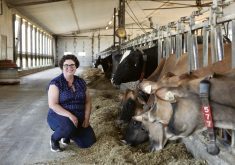The number of farm advisors is growing all the time, which is probably a good thing given that over 150,000 Canadian farms still need to plan and execute a succession of some kind, whether it’s a transition to the next generation or outside the family.
And the need for advice won’t stop there. Already, more farms every year are scheduling routine annual meetings with their farm advisory team. That’s not only because their farms are becoming bigger and more technologically advanced, and because they have more complex business needs. It’s also because these farmers have come to believe farm advisors will help them unlock more opportunities.
Now, business experts say this whole issue of a farmer knowing what they can get from their advisory team, and how to get it, is climbing near the top of the traits it takes to succeed in the 2020s.
Read Also

Farmland values: assumptions and realities
Where farmland values are headed and what decisions farmers should make
“Farmers are seeking the tools and skills to lead and empower their teams effectively,” says Heather Watson, executive director of Farm Management Canada.
And with agriculture undergoing constant change, there is always be the “new thing” that farm owners and operators need to understand and then to evaluate for their farms.
New on your agenda
Liz Robertson, executive director of CAFA (Canadian Association of Farm Advisors) predicts technology will be one of the biggest drivers, but not necessarily in the way that you might expect.
Selling and buying property using cryptocurrencies like Bitcoin is a new area that CAFA is tracking and providing information to its members on.
Another big issue is who collects, owns and uses the data that farmers are collecting every day through their farm equipment like tractors and combines.
There will also be a need for more legal advice.
“One of the biggest increases in professions in the farm advisors sector is from the law profession,” Robertson says.
That’s been driven partly by the increase in the value of farmland. With the money involved in farm transfers today, transactions can no longer be done with a handshake, and there can be all kinds of issues stirred up when it comes to farming and non-farming offspring all wanting a share of the pie. But there has also been a significant increase in litigation from people and groups who live in close proximity to farms or who hold strong opinions about how they should be run.
“You’ve got cities, suburbs and acreages bumping up against farms, so you’ve got litigation going on because you’re driving your tractor down the road at five a.m., or your cattle or pigs smell and someone finds that offensive. So, now we have lawyers who handle those issues too,” Robertson says.
The environment and mental health
Another area that will produce challenges and opportunities for farms is the environment, with farmers being called upon to reduce their carbon footprint and increase stewardship of the land base, and to help mitigate the effects of climate change through efforts such as preserving natural grasslands and sequestering carbon.
At some point, farmers will likely be able to participate in carbon trading or incentive schemes to reward them for that stewardship, and if the carbon trading schemes adopted to date are anything to go by, that will need some specialized knowledge to decipher and set up.
Farming has always been a stressful occupation, but the stresses of modern agriculture are bringing the importance of mental health strongly to the fore, and it’s likely that more trained mental health professionals will be making their services available through farm advisor networks.
In 2020, Farm Management Canada conducted a study looking at the drivers and barriers to adopting business practices on the farm. While increasing profitability and managing risk remained the top drivers, new drivers surfaced including maintaining farm and family team harmony and reducing stress and anxiety. Another study the same year looked at the connection between mental health and farm management practices. Results revealed three out of four farmers report mid- to high stress levels.
“The unpredictability of the agricultural sector, workload pressures and financial pressures were cited as the greatest stressors by Canada’s farmers,” says Watson.
The surprise is how important advisors such as accountants and lawyers can be for addressing the issue. Of the farmers surveyed, 85 per cent also said that following a business plan contributed to greater peace of mind and reduced stress and anxiety. Farm owners are seeing that supporting their own mental health and those of others on the farm is a good investment in the overall health and success of the farm.
Focusing on communications
Andrew Leach, a farm advisor with Farm Life in Ontario, sees rising demand for family coaching and communication development, especially among the next generation of farmers.
“Feedback I get from the next generation of farmers is that the biggest thing facing them right now is clarity,” Leach says.
“There’s so much uncertainty with younger farmers about how can they possibly take over a farming operation with the values that are placed on them today. How can they transition ownership of farming assets from their parents while ensuring they are fairly compensated too?”
That uncertainty makes many young people reluctant to commit their future to farming because, without a professional plan on paper, they don’t know where their entry point will be, Leach says.
“It’s borderline impossible as a young individual to purchase a farm and start from scratch now,” he says. “Without succession strategies it’s very difficult to start a farm of your own. And with the values placed on farms today, it’s not a simple discussion anymore.”
Previous farming generations often treated farm succession as an estate plan, as opposed to a transition during their lifetime, which is more often the case today.
“That’s creating a lot of fear amongst the younger generation,” Leach says. “Dad has not even got the farm yet, so where does that leave me, is it 40 more years until I can take over this farm?”
When you think about that, it’s a daunting prospect for some kids. “Getting clarity for that next generation and making them more aware of some of the strategies that are available to them has got really important moving forward,” Leach says.
Otherwise, Leach says, there will be a growing risk that agriculture’s next generation will head to town. “It’s important to keep that next generation of farmers motivated.”
















